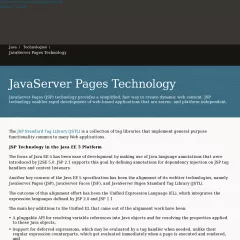JavaServer Pages 
JavaServer Pages is used by 0.03% of sites
Official Website
http://www.oracle.com/technetwork/java/javaee/jsp/index.htmlCategory
Web Frameworks
JavaServer Pages (JSP) is a technology that allows developers to create dynamic web pages using Java. It combines HTML or XML markup with embedded Java code to generate dynamic content and interactive components on the server-side.
Key Features:
- Server-side Scripting: JSP enables the inclusion of Java code within HTML or XML files, allowing dynamic content generation and server-side processing. Java expressions, scriptlets, and declarations can be embedded directly into the JSP page.
- Seamless Java Integration: JSP seamlessly integrates with Java servlets and other Java-based technologies. It leverages the full power of the Java programming language, including access to Java libraries, databases, and external APIs.
- Dynamic Content Generation: JSP enables the generation of dynamic content by embedding Java code within the markup. Developers can generate HTML, XML, or any other text-based output dynamically based on user input, database queries, or application logic.
- Reusable Components: JSP allows developers to create reusable components and custom tags, promoting modular and maintainable code. These components can be shared across multiple JSP pages, improving code organization and development efficiency.
- Easy Presentation Logic: JSP separates presentation logic from business logic by providing tags and expressions to conditionally display content, iterate over data collections, perform calculations, and format output. This separation enhances code readability and maintainability.
- Support for JavaEE Standards: JSP is part of the JavaEE (Java Enterprise Edition) stack and integrates seamlessly with other JavaEE technologies such as servlets, JavaBeans, and JavaServer Faces (JSF). This allows developers to build robust and scalable web applications.
- Extensive Tag Libraries: JSP provides tag libraries that offer ready-to-use tags for common tasks such as form handling, database access, internationalization, and session management. These tag libraries simplify development and reduce the amount of custom code required.
- Integration with MVC Frameworks: JSP works well with Model-View-Controller (MVC) frameworks like Spring MVC and Apache Struts. It can be used as the view layer, allowing developers to separate the presentation logic from the business logic and data access layers.
JavaServer Pages (JSP) empowers developers to create dynamic and interactive web pages using Java. With its seamless integration with Java, support for JavaEE standards, and extensive tag libraries, JSP provides a powerful platform for building scalable and robust web applications.